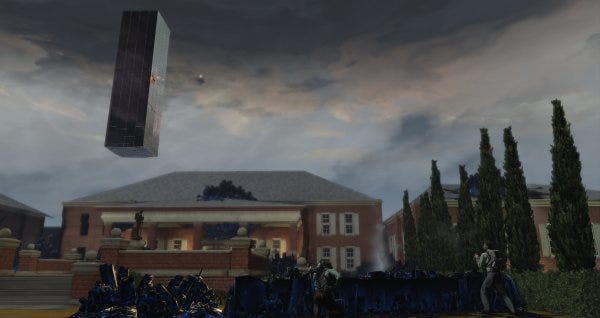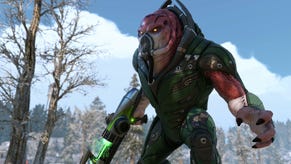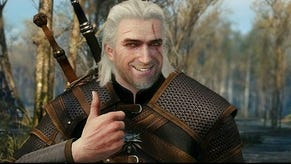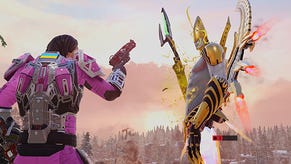Interview: XCOM Tells The "Origin Story"
Cube Mapped
Recently we had a chance to look at 2K's intriguing reboot of XCOM - and a full XCOM preview is coming up soon - but first there's an interview which explains a bit about the world, and the intention to tell a story about the origin of the XCOM alien invasion in the setting of 1960s America.
In the depths of a bunker packed with strange humanoids that communicated almost entirely using the words “like”, “totally” and “hella” we spoke to something that claimed to be Jonathan Pelling, Creative Director at 2K Marin, developers of XCOM. Here's what he had to say...
RPS: More story-focused than the peripatetic original plan; is this because you've got people like Jordan Thomas and yourself on board and you're trying to make use of people who are much more used to telling stories, rather than something stochastic or random?
Pelling: We came to realise that our studio has a strength in its storytelling and narrative abilities. He is a relatively recent addition to the project and he's been an absolute treasure as far as the narrative is concerned in the game. What we really want to do with XCOM is tell the origin story... y'know, even last year when we showed the game we were planning to structure the game around a central narrative thread with side missions and other opportunities that you can pursue in order to grow resources and technology and so on. That structure is still in place, but this year we're talking more about how big our story is, how compelling it is.

RPS: The original X-COM had the situation where there were a massive variety of scenarios, aliens and situations to struggle through, so that you got used to the challenges facing you as well as getting used to the enemies. Will you be going for something similar, or will you be trying to keep the story tight and omit repetition?
Pelling: Yeah, our goal is to tell a really interesting story through the main thread, so there are a lot of really great set pieces to encounter along the way; but within that, there are grades, if you like. There's a primary storytelling environment, and there's other side-missions are not going to be as highly scripted in a narrative sense as the main missions themselves.
RPS: You've also changed the combat structure to follow Mass Effect; the powers, the pause time menu, the combat aesthetic, and a limitation on three agents being directly controlled. Will that be the same throughout the game?
Pelling: Our view was to give you the central character and the two agents, as your right and left hand. They're kind of; you almost equip your agents with... they themselves are equipped with various technologies and tactical capabilities, so what we want from the combat is to make it very, y'know, tactical but also not overwhelming in terms of its complexity. We don't want players to micromanage the combat, so we want the agents individually to be really strong tools. You're not going to just be able to run out there, because the odds are stacked against you. If you try and run and gun through the game, you'll just get cut down. Using your agents, but having these agents be individual but also class-based; how you upgrade them and what alien tech you give them, but we do keep a tight squad.

RPS: As you say, they're class-based; are there multiple individuals of each class? Jordan was talking about how they could get injured and hence not be available for a mission.
Pelling: You played the original? So you'd be totally familiar with how you could recruit dudes; they each come with their own stats and be complete individuals in their own right. We have a similar system; it's not as heavily stat-based as it was, it's more power-based. The Commando has a certain special attribute, but also has a couple of perks and active-use abilities, and those will become more marked as you essentially level him up and take him into the field and he gains in experience. Those powers are inherent both to the class but also you can choose to equip them with whatever alien tech you happen across in the field. You can build a stable of agents and have a large number of them, and have multiples of classes.
RPS: Could you go into a mission just with Commandos then?
Pelling: Not necessarily; there's variability in each class, in how you choose to upgrade. You might have a couple of very different Commandos.

RPS: The design aesthetic at the moment is very... the obvious referent is Mad Men; I'm sure five years ago it would have been All The President's Men or a different TV series. Your base has that office-y environment, whilst being a lovely little hub for you to explore, and the suburban areas are very familiar as well; will you be moving out of those?
Pelling: I won't reveal any specific locations, but we do visit quite a large number of places, both full of Americana, the places where people live and being overrun by the aliens, and some of the territory that the aliens that have captured and terraformed.
RPS: The epicenter of the invasion seems to be somewhere, not quite the East coast of America, but somewhere mid-East (between Chicago, Indiana, Ohio and Michigan); is there a reason for that, or is it just an arbitrary location?
Pelling: Well, that's partly something in the narrative that I don't want to reveal; but the aliens, y'know, it's kinda an important point. This is the origin of XCOM and this is the epicenter of the invasion; those states they're terraforming and moving out. Missions appear at the crest of their spread, as well as side mission and story missions taking place inside the area.

RPS: And that area; it's basically become the surface of an alien planet and humans can't survive in it?
Pelling: Umm, effectively. It's not completely inhospitable, you might take missions there, but it's basically territory that's been claimed and you saw some of the terraforming happening in the demo.
RPS: It was very impressive; that cubist design you've got for it; it's like being attacked by Picasso [you mean Piet Mondrian? - pernickety art Ed]. But what's happening to the rest of the world whilst this is going on?
Pelling: That's the epicenter, but it is spreading. What we're ultimately suggesting, I guess, is that whilst XCOM starts small, it eventually grows, forged in the fire of combat, to something that's capable of encompassing the globe.
RPS: I wouldn't imagine that this means it ties into the previous XCOM games, as a kind of prequel, because it seems that you're looking to reboot the series as a whole, and later games will be more of our time. But are there any political implications from your choice of this era; this is set in ‘61, you have McCarthyism and the Cuban Missile Crisis in ‘62; will this be reflected in the game?
Pelling: There is a cast of characters that you work with inside your organisation. The agents you work with are generated specifically to you the player; the characters in the base that you meet, like the heads of each XCOM department, are guys that you'll be able to talk to, have conversations with. As for the politics of the time, the theme of the game is xenophobia and so there's obvious things there. Within America at that time you have a blossoming of the minorities and repressed parts of society coming out and having their voices heard, and some of the characters in your base are voices of those factions.

RPS: Given the situation you're setting up here, it's highly unlikely the Vietnam war will ever happen, which changes the future history of the US, meaning you won't get the same summer of '69, but that sort of growth of the youth of the US, is it the sort of thing that could be provoked by XCOM, the invasion, or the military's response?
Pelling: The invasion event has a polarising effect and it's going to be really interesting to explore within the narrative how it affects individuals and how it affects the overall politics of America and the world in the future. You might have noticed in Carter's office that there's still a picture of Kennedy, so he's the president during this; some things are still the same.
RPS: Thanks for your time.
















